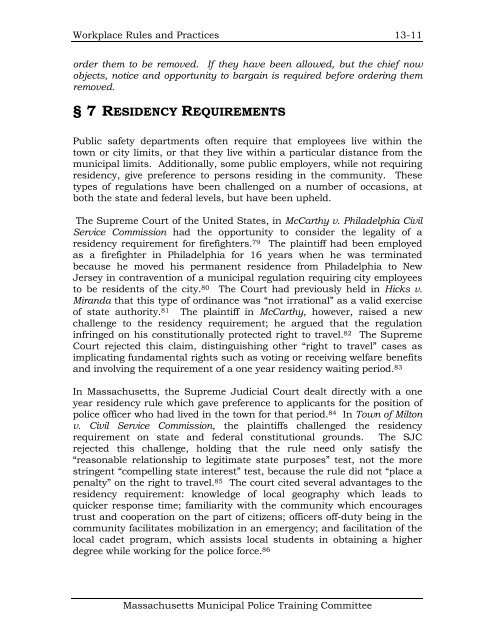Management Rights - AELE's Home Page
Management Rights - AELE's Home Page
Management Rights - AELE's Home Page
Create successful ePaper yourself
Turn your PDF publications into a flip-book with our unique Google optimized e-Paper software.
Workplace Rules and Practices 13-11<br />
order them to be removed. If they have been allowed, but the chief now<br />
objects, notice and opportunity to bargain is required before ordering them<br />
removed.<br />
§ 7 RESIDENCY REQUIREMENTS<br />
Public safety departments often require that employees live within the<br />
town or city limits, or that they live within a particular distance from the<br />
municipal limits. Additionally, some public employers, while not requiring<br />
residency, give preference to persons residing in the community. These<br />
types of regulations have been challenged on a number of occasions, at<br />
both the state and federal levels, but have been upheld.<br />
The Supreme Court of the United States, in McCarthy v. Philadelphia Civil<br />
Service Commission had the opportunity to consider the legality of a<br />
residency requirement for firefighters. 79 The plaintiff had been employed<br />
as a firefighter in Philadelphia for 16 years when he was terminated<br />
because he moved his permanent residence from Philadelphia to New<br />
Jersey in contravention of a municipal regulation requiring city employees<br />
to be residents of the city. 80 The Court had previously held in Hicks v.<br />
Miranda that this type of ordinance was “not irrational” as a valid exercise<br />
of state authority. 81 The plaintiff in McCarthy, however, raised a new<br />
challenge to the residency requirement; he argued that the regulation<br />
infringed on his constitutionally protected right to travel. 82 The Supreme<br />
Court rejected this claim, distinguishing other “right to travel” cases as<br />
implicating fundamental rights such as voting or receiving welfare benefits<br />
and involving the requirement of a one year residency waiting period. 83<br />
In Massachusetts, the Supreme Judicial Court dealt directly with a one<br />
year residency rule which gave preference to applicants for the position of<br />
police officer who had lived in the town for that period. 84 In Town of Milton<br />
v. Civil Service Commission, the plaintiffs challenged the residency<br />
requirement on state and federal constitutional grounds. The SJC<br />
rejected this challenge, holding that the rule need only satisfy the<br />
“reasonable relationship to legitimate state purposes” test, not the more<br />
stringent “compeling state interest” test, because the rule did not “place a<br />
penalty” on the right to travel. 85 The court cited several advantages to the<br />
residency requirement: knowledge of local geography which leads to<br />
quicker response time; familiarity with the community which encourages<br />
trust and cooperation on the part of citizens; officers off-duty being in the<br />
community facilitates mobilization in an emergency; and facilitation of the<br />
local cadet program, which assists local students in obtaining a higher<br />
degree while working for the police force. 86<br />
Massachusetts Municipal Police Training Committee
















